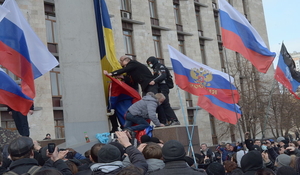Learning Lessons from the Ukraine Conflict

“Learning Lessons from the Ukraine Conflict“
Speakers: Angevine, R. (Institute for Defense Analyses (IDA)); Frye, C. (IDA); Warden, J. (IDA)
Date: 18 July 2019
Speaker Session Preview
SMA hosted a speaker session presented by Dr. Robert Angevine (Institute for Defense Analyses (IDA)), Mr. Clark Frye (IDA), and Mr. John Warden (IDA) as a part of its SMA EUCOM Speaker Series. Dr. Angevine first explained that he and his colleagues conducted this research due both to shared topical interest and the lack of sufficient attention being paid to the lessons learned from the Ukraine conflict. Moreover, they argued that other efforts conducted by the Military Services and others to collect lessons from the conflict in Ukraine are notable, but generally cluster in two categories: geo-political and tactical/technical. Consequently, the current research effort was conducted in order to develop lessons in the broad middle ground, focusing on the operational level. By examining these lessons learned, Dr. Angevine, Mr. Frye, and Mr. Warden were able to discern functional or temporal gaps in the literature surrounding this conflict, identify ways to address gaps, and best utilize the work that was already conducted. Mr. Frye highlighted key trends evident from Russian military operations in eastern Ukraine, while focusing on force structure and personnel, ground operations, air operations and air and missile defenses, and information operations. Mr. Warden then outlined the implications of the developments in those areas for the US military based on the lessons learned from the Ukraine-Russia conflict. Some of the primary implications were: 1) Russia was able to combine tactical mobility with air and information operations to succeed in Ukraine, and thus might use a similar tactic against the US and/or NATO nations; 2) If one considers a future conflict between Russia and a NATO nation, future operations are likely to occur in areas covered by Russia’s air and missile bases; and 3) Russia is adept at having paramilitary and operational forces operate at the same time, which will make counter operations more difficult in the future. To conclude, Dr. Angevine discussed the broader implications for the Ukraine conflict on future warfare. Specifically, he spoke about balancing the benefits and risks of connectivity, conducting operations in contested air environments, and unit size and dispersion.
Comments